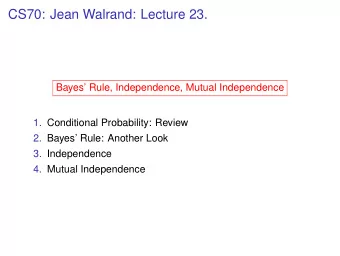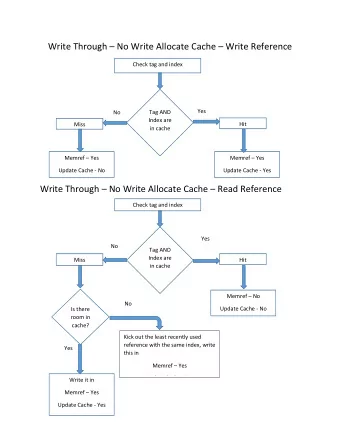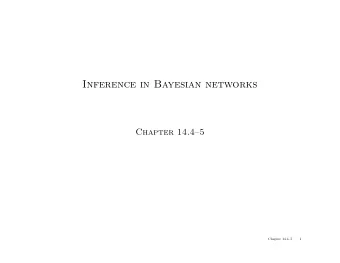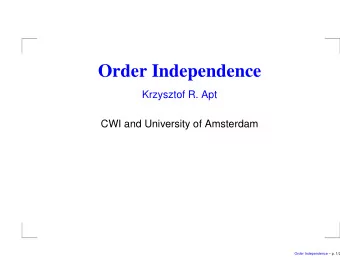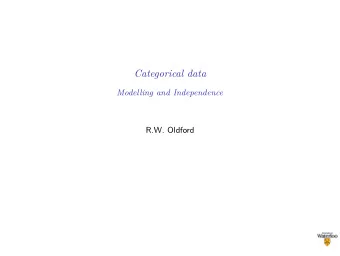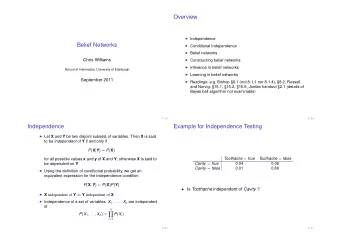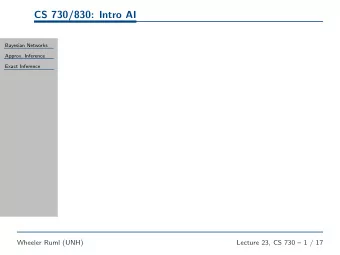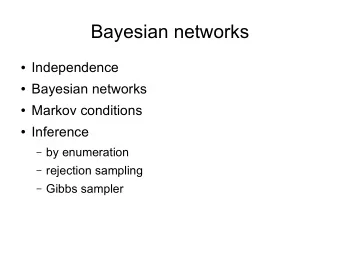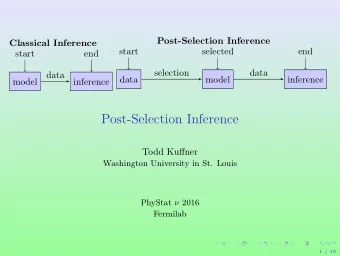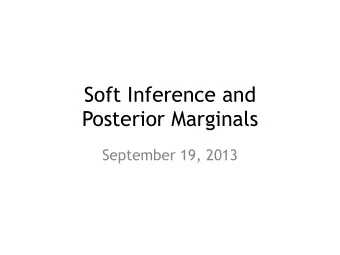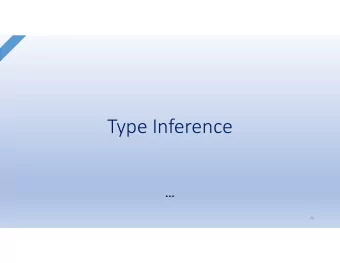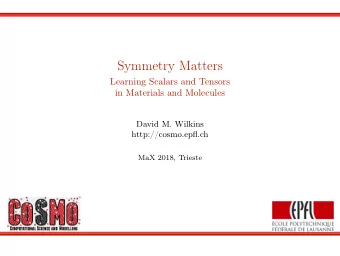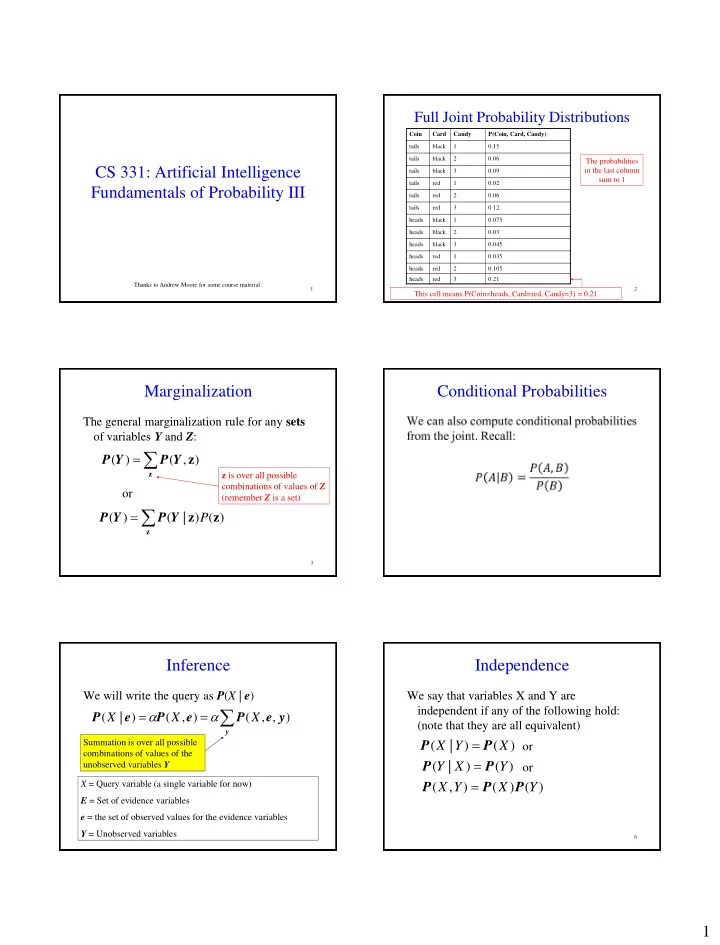
( ) ( | z ) P ( z ) P Y P Y z 3 Inference - PDF document
Full Joint Probability Distributions Coin Card Candy P(Coin, Card, Candy) tails black 1 0.15 tails black 2 0.06 The probabilities CS 331: Artificial Intelligence in the last column tails black 3 0.09 sum to 1 tails red 1 0.02
Full Joint Probability Distributions Coin Card Candy P(Coin, Card, Candy) tails black 1 0.15 tails black 2 0.06 The probabilities CS 331: Artificial Intelligence in the last column tails black 3 0.09 sum to 1 tails red 1 0.02 Fundamentals of Probability III tails red 2 0.06 tails red 3 0.12 heads black 1 0.075 heads black 2 0.03 heads black 3 0.045 heads red 1 0.035 heads red 2 0.105 heads red 3 0.21 Thanks to Andrew Moore for some course material 1 2 This cell means P(Coin=heads, Card=red, Candy=3) = 0.21 Marginalization Conditional Probabilities The general marginalization rule for any sets of variables Y and Z : ( ) ( , z ) P Y P Y z z is over all possible combinations of values of Z or (remember Z is a set) ( ) ( | z ) P ( z ) P Y P Y z 3 Inference Independence We will write the query as P ( X | e ) We say that variables X and Y are independent if any of the following hold: P ( X | e ) P ( X , e ) P ( X , e , y ) (note that they are all equivalent) y Summation is over all possible ( | ) ( ) P X Y P X or combinations of values of the unobserved variables Y P ( Y | X ) P ( Y ) or X = Query variable (a single variable for now) ( , ) ( ) ( ) P X Y P X P Y E = Set of evidence variables e = the set of observed values for the evidence variables Y = Unobserved variables 6 1
Bayes’ Rule Bayes’ Rule More generally, the following is known as Bayes’ Rule: The product rule can be written in two ways: P(A, B) = P(A | B)P(B) Note that these are ( B | A ) ( A ) P P ( | ) P A B distributions P(A, B) = P(B | A)P(A) ( ) P B Sometimes, you can treat P (B) as a normalization constant α You can combine the equations above to get: ( | ) ( | ) ( ) P A B P B A P A ( | ) ( ) P A B P B ( | ) P B A ( ) P A 7 8 More General Forms of Bayes Rule When is Bayes Rule Useful? Sometimes it’s easier to get P(X|Y) than P(Y|X). If A takes 2 values: ( | ) ( ) P B A P A ( | ) P A B Information is typically available in the form ( | ) ( ) ( | ) ( ) P B A P A P B A P A P(effect | cause ) rather than P( cause | effect ) If A takes n A values: For example, P( symptom | disease ) is easy to ( | ) ( ) P B A v P A v ( | ) i i P A v B measure empirically but obtaining P( disease | i n A symptom ) is harder ( | ) ( ) P B A v P A v k k k 1 9 10 Bayes Rule Example Bayes Rule Example Meningitis causes stiff necks with probability 0.5. The prior Meningitis causes stiff necks with probability 0.5. The prior probability of having meningitis is 0.00002. The prior probability probability of having meningitis is 0.00002. The prior probability of having a stiff neck is 0.05. What is the probability of having of having a stiff neck is 0.05. What is the probability of having meningitis given that you have a stiff neck? meningitis given that you have a stiff neck? Let M = patient has meningitis Let M = patient has meningitis Let S = patient has stiff neck Let S = patient has stiff neck Note: Even though P(s|m) = 0.5, P( s | m ) = 0.5 P( s | m ) = 0.5 P(m|s) = 0.0002 P( m ) = 0.00002 P( m ) = 0.00002 P( s ) = 0.05 P( s ) = 0.05 P ( s | m ) P ( m ) ( 0 . 5 )( 0 . 00002 ) P ( s | m ) P ( m ) ( 0 . 5 )( 0 . 00002 ) P ( m | s ) 0 . 0002 P ( m | s ) 0 . 0002 ( ) 0 . 05 ( ) 0 . 05 P s P s 2
Bayes Rule With More Than One How is Bayes Rule Used Piece of Evidence Suppose you now have 2 evidence variables In machine learning, we use Bayes rule in the Card=red and Candy = 1 (note that Coin is following way: uninstantiated below) Likelihood of the data Prior probability P ( Coin | Card=red, Candy = 1 ) = α P ( Card=red, Candy = 1 | Coin ) P ( Coin ) h = hypothesis D = data ( D | h ) ( h ) In order to calculate P ( Card=red , Candy = 1 | Coin ), P P ( | ) P h D you need a table of 6 probability values. ( ) P D With N Boolean evidence variables, you need 2 N probability values. Posterior probability 13 14 Why is independence useful? Conditional Independence Suppose I tell you that to select a piece of Candy , I first flip a Coin . If heads, I select a Card from one (stacked) deck; if tails, I select from a different (stacked) deck. The color of the card determines the bag I select the Candy from, and each bag has a different mix of the types of Candy . This table has 2 values This table has 3 values Are Coin and Candy independent? • You now need to store 5 values to calculate P ( Coin , Card , Candy ) • Without independence, we needed 6 15 16 Conditional Independence Conditional Independence General form: ( A , B | C ) ( A | C ) ( B | C ) P P P Or equivalently: ( | , ) ( | ) P A B C P A C and P ( B | A , C ) P ( B | C ) How to think about conditional independence: In P( A | B , C ) = P( A | C ): if knowing C tells me everything about A, I don’t gain anything by knowing B 17 18 3
Conditional Independence Candy Example Coin P(Coin) Coin Card P(Card | Coin) Card Candy P(Candy | Card) 11 independent values in table tails 0.5 tails black 0.6 black 1 0.5 (have to sum to 1) heads 0.5 tails red 0.4 black 2 0.2 heads black 0.3 black 3 0.3 P ( Coin, Card, Candy) heads red 0.7 red 1 0.1 = P ( Candy | Coin, Card ) P ( Coin, Card ) red 2 0.3 = P ( Candy | Card ) P ( Card | Coin ) P ( Coin ) red 3 0.6 4 independent 2 independent 1 independent values in table values in table value in table Conditional independence permits probabilistic systems to scale up! 19 20 CW: Practice What You Should Know Coin P(Coin) Coin Card P(Card | Coin) Card Candy P(Candy | Card) • How to do inference in joint probability tails 0.5 tails black 0.6 black 1 0.5 heads 0.5 tails red 0.4 black 2 0.2 distributions heads black 0.3 black 3 0.3 • How to use Bayes Rule heads red 0.7 red 1 0.1 • Why independence and conditional red 2 0.3 red 3 0.6 independence is useful 21 22 4
Recommend
More recommend
Explore More Topics
Stay informed with curated content and fresh updates.
